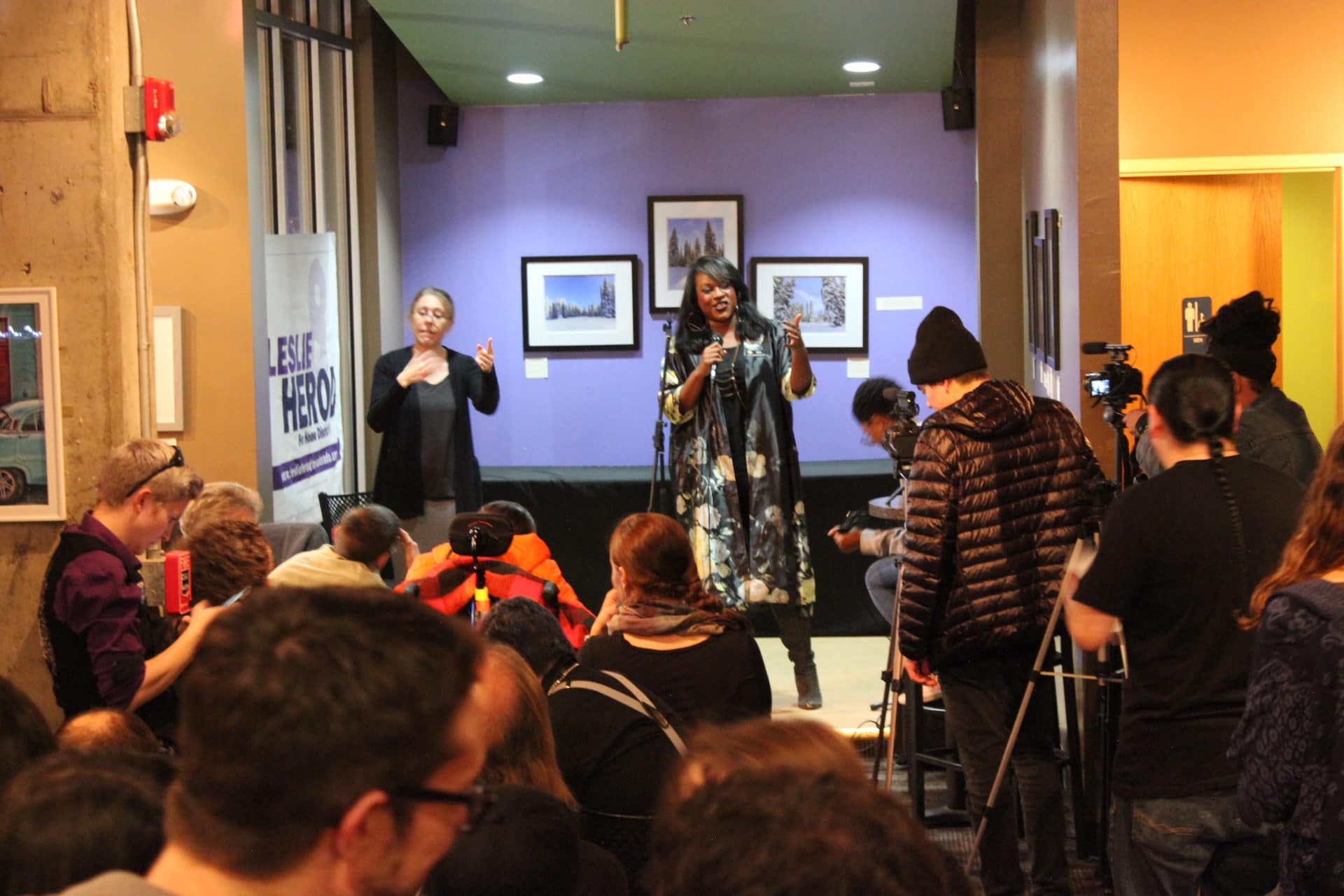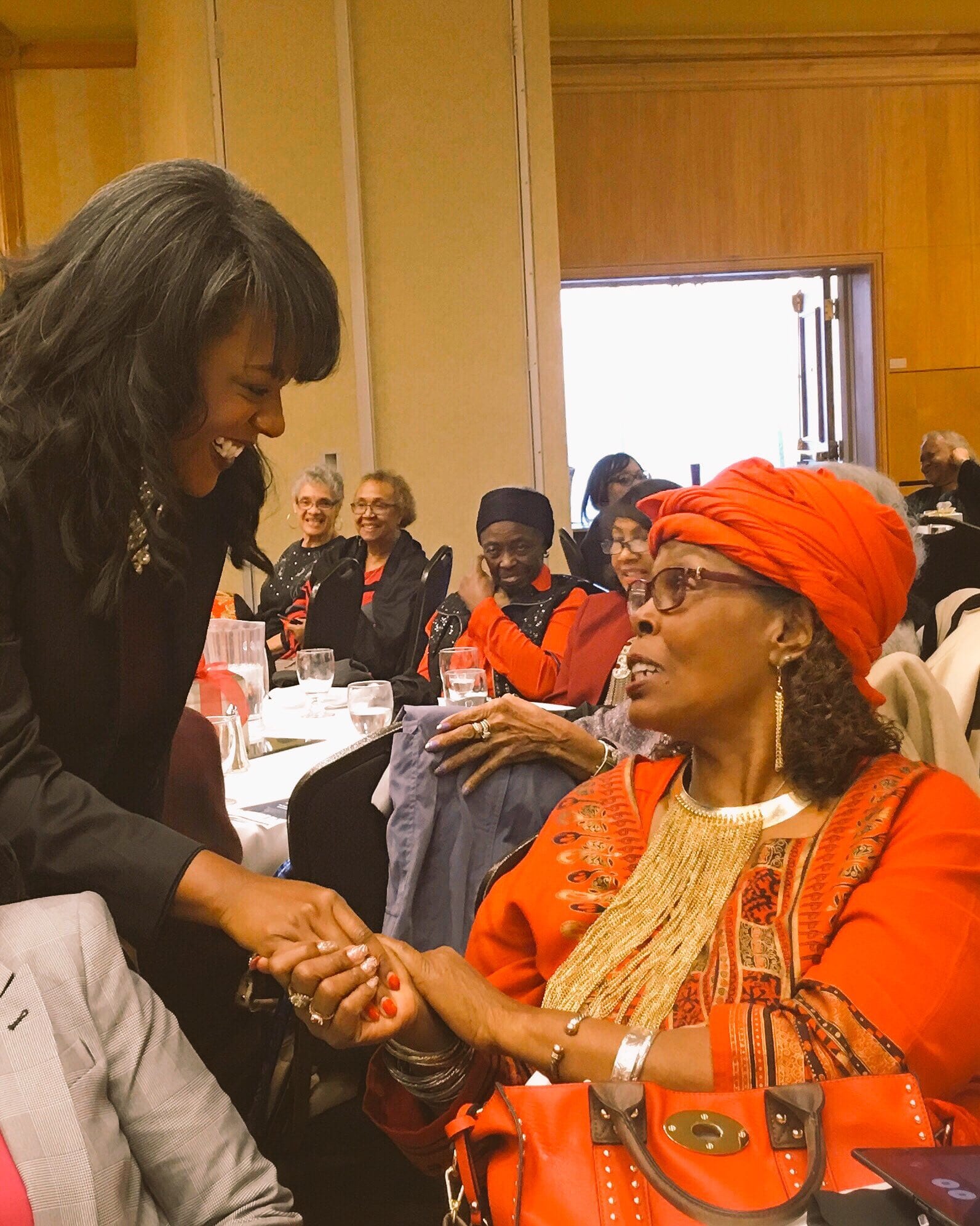It’s April 12th, Friday afternoon, and Colorado State Representative Leslie Herod plans to stay well into the night. Today, she will present her arguments for the passage of House Bill 1250, which – if it passes – will close the loophole that allows Colorado police officers to assault people in their custody.
“It might be a fight,” Herod tells ESSENCE as she looks around the House chambers – where hers is one of only six Black faces. “But we’ll see,” she sighs.
House Bill 1250 is not the first fight for Rep. Leslie Herod, Colorado’s first Black LGBTQ person to be elected to the state legislature. Since she took office in 2016, Herod has become the kind of lawmaker that those who rail against ‘identity politics’ would love to hate.
She doesn’t shy away from talking about identity, marginalization, and power – especially in her focus on criminal justice reform. Just this year, she’s fighting to increase education and employment access for formerly incarcerated people, enact bail reform, reduce the penalties for possession of controlled substances, and provide free menstrual products for incarcerated women, among many other issues.
Recently, Herod introduced new legislation that made tampons and pads free in county jails. Providing these feminine hygiene products is a victory and an important one. After prominent Colorado activist Elisabeth Epps went to county jail in February, she wasn’t given access to tampons or pads. She started her cycle on the first night but was told she had to wait nine days for her commissary to come in.

But even before Epps’ experience, Herod was motivated after learning of her older sister’s treatment while in prison. In her TEDTalk, Herod speaks about how her sister often had to choose between buying sanitary products or buying postage to send her children letters.
In her fight to close the loophole that allows law enforcement officer to sexually assault those in their custody, Herod is still leaning into both her own identity and her sister’s experiences.
Herod tells ESSENCE that “ For as long as I can remember, [my older sister] has been in the criminal justice system… there was this cycle of poverty, addiction, and incarceration. [But] the addiction actually stemmed from something much deeper… she was sexually assaulted when she was 16.”

Speaking with her female constituents who have been sexually assaulted while incarcerated or in custody made Herod realize how common this issue was, saying “ [the survivors] didn’t think they had a voice to say no, give consent, or get justice for themselves. It’s happening right here in Colorado, and it’s happening all over the country, and we need to change our laws.”
Herod is right. According to the Vera Institute of Justice’s 2016 survey titled “Overlooked: Women and Jails in an Era of Reform,” 86% of women who have been incarcerated have been sexually assaulted at some point in their lives. Two-thirds of incarcerated women are women of color, and 82% suffer from drug or alcohol addiction. The Justice Department also found that among other prisoners, trans women are nine times more likely to be sexually harassed or assaulted. And according to the CDC’s National Intimate Partner and Sexual Violence Survey, 46 percent of bisexual women have been raped, compared to 17 percent of heterosexual women and 13 percent of lesbians. And 40 percent of gay men and 47 percent of bisexual men have experienced sexual violence other than rape.
The survivors didn’t think they had a voice to say no, give consent, or get justice for themselves. It’s happening right here in Colorado, and it’s happening all over the country, and we need to change our laws.
Rep. Leslie Herod
All these statistics paint a bleak picture of vulnerabilities – of ethnicity, of gender, of sexuality, of ability, of class, and others – and these are what law enforcement officers are exploiting when they choose to assault those in their custody. And when Herod introduces legislation like House Bill 1250, Herod keeps these marginalized people at the forefront of her mind.
When Herod first decided to take this issue on, Colorado law said that people could not be assaulted while they were in prison, jail, or a hospital. However, the law said nothing about people who were in custody – people who are under arrest or are stopped by an officer – and it was this loophole that put the most vulnerable Coloradans in danger. In August 2017, a Westminster cop named Curtis Arganbright assaulted a woman who struggled with alcoholism, after she had been accused of theft. According to the victim, he forced her to have intercourse while she was handcuffed. Arganbright was only convicted of two misdemeanors – abuse of power and unlawful sexual conduct – and was sentenced to 90 days in jail. As a defense, his attorney Doug Jewell claimed the woman did consent and that Arganbright merely “took an opportunity.”
Had House Bill 1250 been enacted at this time, Arganbright would have been convicted of a felony, because the law would have accurately reflected the unequal power dynamics between an officer and a detainee. The law would have firmly stated that consent was impossible. And this would have also applied to the former Lakewood police officer who was accused of sex-related crimes on duty multiple times.
Outside of Colorado, this abuse of power is still an issue. A 2010 Cato Institute review shows that after excessive force, sexual violence are the most frequently reported form of police misconduct. Daniel Holtzclaw was sentenced to 263 years in prison after assaulting 13 black women and girls as an Oklahoma City police officer. Holtzclaw specifically went after young women, women who struggled with substance abuse, and women who he perceived to be sex workers.
“Some people might argue that we don’t need this law and maybe it’s only one or two cases a year,” Rep. Herod told 9News in reference to House Bill 1250. “And I say one or two cases is too much.”

One would hope that passing a bill making it illegal for a law enforcement officer to rape someone in their custody would face no opposition. But Herod knows better, saying a few of her colleagues do oppose House Bill 1250, and she expects them to express that opposition tonight. “Conservatives normally will always vote to expand laws that will prosecute people… they won’t do that for law enforcement. But this shouldn’t be a party line issue, and so it’s disappointing to see my colleagues supporting this kind of behavior,” Herod tells ESSENCE.
When the time comes for Herod to argue House Bill 1250, she’s immediately faced with opposition. Larry Liston, a Republican legislator urging a No vote, says that he finds it “ironic that the bill that I brought… I was told no… because we don’t want to create new felonies. And now [House Bill 1250] is brought forward to go after police officers.”
Another Republican lawmaker, Rob Bockenfeld, angrily says that Herod’s bill will “strip law enforcement officers of the only defense they have.”
In rebuttal, Herod’s voice thunders over the chatter of her colleagues. The room grows quieter as she addresses them: “Where do I start? What we are talking about is law enforcement officers who take our their badge, who flash their lights – which is a sign of authority – and then tell someone to perform a sexual act on them. What is absurd is if we as a General Assembly would allow this loophole in Colorado law to continue, to allow people who are already vulnerable to continue to be victimized by law enforcement officers…When someone has a gun and says ‘perform a sexual act on me right now’, you cannot give consent.”
Bockenfeld is shaking his head, in clear disagreement, as Herod continues.
“If we want to defend our brave men and women in blue, then the right thing to do is to ensure that we have those who do not belong in uniform off the street. We [must] ensure that when they’re on the street, they’re doing what they’re called to do, which is protect and serve, not rape.”
When it comes time to vote, the chambers fill with a resounding and resolute “YES.” Bockenfeld shouts his No vote, his voice booming over his colleagues. But it doesn’t matter. House Bill 1250 has passed. Herod has secured yet another victory in her ongoing battle to reform the criminal justice system in Colorado.
When someone has a gun and says ‘perform a sexual act on me right now’, you cannot give consent
